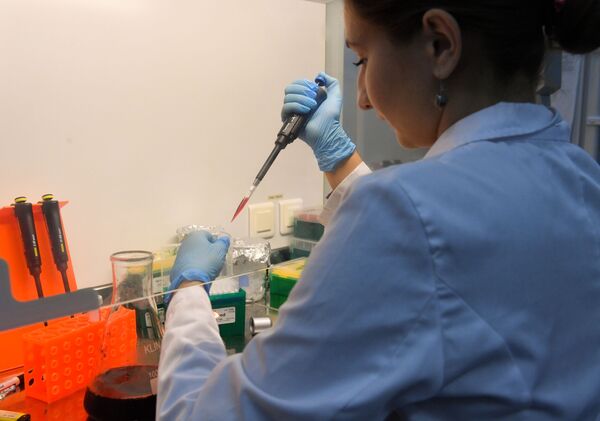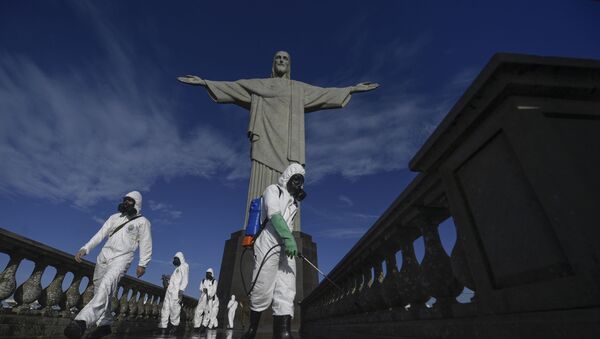The country's President Jair Bolsonaro has been repeatedly subjected to criticism for his handling of the pandemic by international and domestic observers. Speaking to The Guardian last Saturday, ex-Brazilian Health Minister Luiz Henrique Mandetta, who was sacked by the president in April, lashed out at Bolsonaro for leading Brazilians into a "deadly canyon" with his anti-scientific response to COVID-19. The country is now striving to get anti-coronavirus vaccines which could help it tackle the pandemic in the future.
COVID Spiralling Out of Control in Brazil
Brazil has undergone several phases in its fight against the coronavirus pandemic, explains Professor Fabio Sobral, who teaches ecological economy at the Federal University of Ceara.
"In the first phase there was a doctor in charge of the Ministry of Health, Luiz Henrique Mandetta, who tried to implement policies of social isolation, purchase of equipment and essential supplies for the treatment of patients", the academic points out. "His work clashed with the conceptions of President Bolsonaro, who defends the non-isolation and normal maintenance of economic activity, assuming that COVID-19 is a not very serious disease".
After Mandetta was forced to resign, the second phase began with Nelson Teich, an oncologist and health consultant, taking the reins of the country's Health Ministry in April. According to Sobral, Teich also stepped down in mid-May because his efforts to roll out comprehensive nationwide testing as well as to bolster the research of potential treatments and vaccines were also sabotaged and disrupted.
The third phase was marked by the appointment of Eduardo Pazuello, a division general of the Brazilian Army with no medical training, as an interim minister of health. Although previously the Health Ministry team vigorously defended quarantine measures and threw into doubt the efficiency of hydroxychloroquine energetically touted by President Bolsonaro, everything changed under Pazuello.
"Pazuello dismantled the ministry's team of technicians and placed 15 military personnel without health training in central posts", Sobral notes. "[Health] spending has been reduced. The use of chloroquine has been encouraged. The death toll has reached extremely high levels".
One of the Supreme Court judges, Gilmar Mendes, dubbed the handling of the coronavirus pandemic by the federal government as "genocide" and criticised Bolsonaro's decision to put the military in charge of the nation's health.
The pandemic exposed divisions between the federal and local governments as the latter sought to implement independent policies in a bid to curb the pandemic, according to Sobral. In April, the country's Supreme Court ruled that state governors have the authority to implement quarantine measures, axing Bolsonaro's attempt to strip them of these rights.
The 1988 constitution, which was drafted after the country's return to democracy from military dictatorship in 1985, guarantees a certain level of independence for Brazil's state and local levels of government.

Brazilian States Pick Russian, Chinese Vaccines, in Contrast to Bolsonaro
Being dissatisfied with the federal government's handling of the coronavirus outbreak, Brazil's states have jumped at the opportunity to seek their own ways to contain COVID.
Thus, on 12 August, the Brazilian state of Parana signed a deal with the Russian Direct Investment Fund (RDIF) to test and produce Russia's new anti-coronavirus vector vaccine Sputnik V, the first one registered in the world.
"The main advantage of the agreement signed is that the Parana Institute of Technology (Tecpar) will be able to produce the vaccine locally, instead of having to import the necessary batches, which guarantees independence and speed in the response for the immunisation of the population", says Fabio Sobral. "The possibility of local production will probably tend to reduce costs, as long distance transportation under special protective conditions will not be necessary".
The locally produced vector vaccine is expected to be distributed not only across Brazil, but also in other Latin American countries. After the Gamaleya National Research Institute of Epidemiology and Microbiology provides Tecpar with the results of the clinical trials of the vaccine and technological protocols of its production, the state will seek approval from the Brazilian Health Regulatory Agency (Anvisa).
To date, Anvisa has approved clinical trials for four vaccines, which are presently in a human trial stage by producers:
· Chinese pharmaceutical firm Sinovac Biotech in partnership with Butantan Institute;
· Oxford University in partnership with British-Swedish pharma firm AstraZeneca;
· US firm Pfizer in partnership with Germany's BioNTech;
· US company Johnson & Johnson.
Although the Bolsonaro government officially claims to be neutral towards international vaccine producers, it is likely that the federal authorities will submit to pressure from the US and its Western allies, according to the academic.
To illustrate his point, Sobral cites Bolsonaro, who has mocked China's Sinovac Biotech vaccine and openly praised the Oxford-AstraZeneca product, already allocating 1.9 billion reais ($356 million) to purchase 100 million doses and later produce the British-Swedish vaccine in Brazil.
Meanwhile, the state of São Paulo and the local government of Parana have picked China's CoronaVac and Russia's Sputnik V, respectively, the academic points out, foreseeing that the conflict between the states and the federal authorities may further escalate over the acquisition and distribution of the anti-coronavirus vaccines.

Expect Vilification of Russian and China's Vaccines by Western Big Pharma
"The tactics of Washington, the subservient media to these interests and the Bolsonaro government will be directed at trying to cause mistrust of the Sputnik V vaccine", Sobral presumes. "It is about creating fear in the population so that the market can be dominated by laboratories run by Anglo-American corporations. The profits from this would be enormous, as it would try to destroy the competitors by obscure means".
The scientific-technological race has become a bone of contention between the US and its challengers, mainly China and Russia, according to the academic, who is by no means surprised by the media attacks against the Sputnik V's release.
"Whether in the area of communications and data, artificial intelligence (AI), defence systems, energy, transportation networks, the fight is open between the two poles", Sobral observes. "It could not be different in the pharmaceutical area, because the control of patents by the corporate pharmaceutical industry has been a fundamental element for the valuation of stocks traded on stock exchanges".
The pharma industry in developed countries enjoys extraordinary annual profits, the professor highlights, adding that the emergence of cheaper drugs and vaccines competing with those produced by Big Pharma may shake the established system.
"The corporate pharmaceutical mega-industry is beginning to see the water reach its nose", he notes. "We can expect an increasingly aggressive action by this sector against those who are challenging it".




